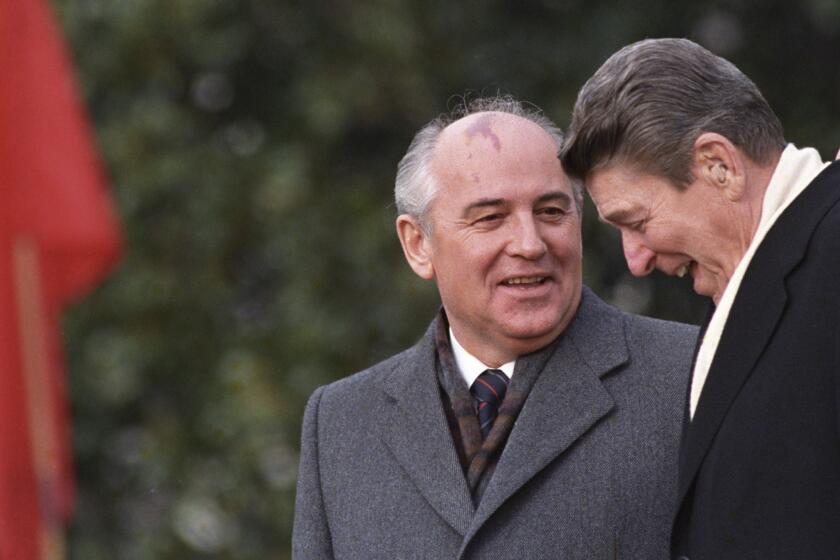Hot GOP Property : Jack Kemp Still Brings Crowds Alive
- Share via
WASHINGTON — As a candidate, most people agree, Rep. Jack F. Kemp, 49, (R-N.Y.) looks like something Hollywood might have dreamed up. He is handsome, articulate and poised, seemingly unaffected and sincere, more committed to principles than ambition. He has a winning way of leaning forward when he talks, and, if his point is especially important, of patting or poking his listener’s arm for emphasis.
Kemp was leaning forward now, gaze direct, tone semi-confiding as he discussed his former inferiority complex.
That was back in the early days, when he first went to Congress, representing suburban Buffalo. He had felt, he said, like an intellectual lightweight, a banged-up, aging jock who would never fit in with the highbrows on Capitol Hill.
Football Image
At the time, 1970, his credentials for the job consisted of a 13-year career in professional football, most notably quarterbacking for the San Diego Chargers and, then, the Buffalo Bills--plus a major in physical education from Occidental College in Los Angeles, his hometown.
By then, most of the major bones in his body had been broken, crushed or fractured at least once--but he had not read many good books, and he had no defined opinions on most major issues.
“I was never actually ashamed of it--but I was always a little defensive, self-conscious about being a pro football player among 400 lawyers, some of them really, really articulate guys,” he says. “I wondered, for a few years, if anybody would ever really take me seriously.”
He is not wondering anymore.
Today, serving his eighth term in the House, Jack Kemp is one of the Republican Party’s hottest properties, probably the only member of the House of Representatives--with the possible exception of Speaker Thomas P. (Tip) O’Neill Jr.--with national name recognition.
Called a Rebel Leader
To some, Kemp is the original “Mr. Supply Side.” To others, he is rebel leader of a new breed of congressional Republicans who call themselves “populists” and openly disdain as “elitists” the established GOP leadership, represented by, among others, Vice President George Bush and Senate Majority Leader Bob Dole of Kansas.
Kemp’s office is flooded with speaking requests from throughout the nation, and wherever he goes, the scene is generally the same: Democrats seem impressed with his energy and style, if not his gospel. And he usually leaves Republican crowds enchanted, in standing ovation--and busily gossiping among themselves later about what a tough time Bush is going to have in 1988, wresting the GOP presidential nomination from such a dynamic, charismatic man.
Kemp is one of those persons whose face gives his mood away. When asked about his presidential ambitions, his eyes shine and, in the second or so before he can gather his expression into the pensive sobriety required, there is a flush of the boy, flattered, who wants to grin.
Then, in a tone of sincerest indecision, Kemp usually says:
“Well, I’ve considered it and will continue to, right through the ’86 elections . . . then I’ll make a firm decision. But, right now my agenda is so full, with tax reform and monetary reform and fiscal reform and other issues that are on the President’s agenda, as well as mine. I would very much like to get this country back on the road to full employment without inflation, and help make my party a governing majority party . . . . “
Other times, though, Kemp’s ego breaks through. Then he practically says that his candidacy, if not his election, is all but inevitable.
“I don’t have the idea that I was born to be President of the United States, I don’t lust after the office. But I’ve always been in leadership positions, or semi-leadership positions,” he declared on one occasion. “And the fact that I am, as a member of the House, even being considered gives me a sense that some of the things I’ve been talking about have captured the imagination of, if not the public, at least my party.
“And the very fact that I am here , at this moment in history, gives me--I don’t want to say a sense of inevitability . . . but I do think it would be wise for me to pursue it to the logical conclusion . . . so it may be that I will decide to run.”
On another occasion, Kemp told a group of Harvard students, in effect, that it was proof of America’s greatness, that he, a mere football player with a degree in PE from Oxy could be elected to Congress and “change the course of history.”
“I was only joking,” he said later, embarrassed.
He was not, of course.
Welcome to Campaign ’88.
Jack Kemp’s political stardom was among the immediate by-products of Ronald Reagan’s election in 1980. For years, Kemp had been the chief Capitol Hill crusader for supply-side tax cuts, preaching his gospel to whomever would listen. But he basically remained just another one of 435 largely anonymous members of the House, until he suddenly found an ideological soul mate in the White House who not only subscribed to supply side theories but also pushed a version of Kemp’s tax plan, co-sponsored by Sen. William V. Roth Jr. (R-Del.), through Congress in 1981.
And, overnight, Jack French Kemp was the man of the hour, featured in all the leading magazines, on all the major talk shows.
He has skillfully maintained his own momentum ever since. Kemp now travels constantly, sometimes crisscrossing the country twice a week, explaining his brand of “populism” and campaigning for, among other things, tax reform, a return to the gold standard and stricter controls on Federal Reserve Board Chairman Paul A. Volcker, whose tight money policies, Kemp is convinced, are ruinous to full economic growth.
In a recent staff reshuffle, Kemp, who already has one of the wealthiest political action committees in town, also hired a handful of Washington’s brightest young political operatives to help plot his route to the White House.
Kemp Staffers Spirited
There is probably no happier, more zealous crowd in town. The mood inside Kemp’s Capitol Hill office these days is hurried, upbeat and a shade self-important, what one might expect to find at a campaign headquarters.
Like many Washington observers, Kemp’s aides seem to assume that it will be a Bush-Kemp ticket in ’88. Which suits them just fine. Because, although they concede, snidely, that Bush has been a “loyal trooper” as vice president, he cannot claim to be Ronald Reagan’s true ideological heir. And Kemp can.
Beyond their mutual faith in supply side economics, Kemp, like Reagan, is a hard-core conservative on most leading social and foreign policy issues. With few exceptions, he has supported Reagan on everything from banning abortions to arming the Nicaraguan “freedom fighters” to the teeth.
But not only do Kemp’s strategists plan on exploiting Kemp’s ideological kinship with Reagan, they hope to take a fair share of credit for the President’s extraordinary popularity, too.
“There’s a symbiosis,” declares Kemp’s new press secretary, John Buckley, 28, former whiz kid of the ’84 Reagan-Bush campaign. “Sure, Jack might not be so well-known without Reagan--but, on the other hand, Reagan owes a lot of his popularity to Jack, too, because he took Kempian ideas and put them into effect . . . . “
Planning for Slump
At the same time, should economic recovery falter, Kemp’s advisers are ready to distance themselves from Reagan, too. As chief of staff David Hoppe, 33, points out, the President did not impose as large a tax cut as Kemp wanted in 1981, nor did he implement it quick enough. Plus, the President has yet to effect either tax or monetary reform, two more key “Kempian ideas.”
Kemp’s young men seem unworried that their candidate has never been tested in an election beyond the boundaries of his working class, predominately Republican congressional district. (He barely won with 52% of the vote in 1970 but, thanks partly to reapportionment, has been handily reelected every term since by margins of at least 70%.)
Nor do they seem bothered by party tradition, which says vice presidents are virtually entitled to the nomination if they want it. And, perhaps least disturbing to them of all is the stark historic fact that no member of the House has made a direct leap to the presidency since Abraham Lincoln, who had served a term before he ran in 1860.
“Television has rendered all the old (election) rules moot,” says consultant Roger Stone, 32. “Jack is already better known than most senators or governors. What a candidate needs now (in the age of electronic democracy) is a media base, more than a geographic base--and Jack already has that by virtue of his ideas.” And, to their everlasting delight, Kemp seems tailor-made for television campaigns, even remembering like an old pro to remove his eye glasses before the cameras roll.
“He’s gonna make Bush look like something right (out of) the American Gothic,” someone cheerfully noted.
Aides Stress Positives
Nevertheless, Kemp’s strategists are busily stressing the breadth of his congressional experience these days, pointing out that, as chairman of the House Republican Conference, he is the third-ranking House Republican and underscoring his role on both the House budget and appropriations committees. Kemp is also senior Republican on the foreign operations subcommittee, but, anticipating criticism that Kemp is weak in foreign affairs, his staff is presently planning several trips to NATO countries and elsewhere, to strengthen his image.
In his speeches, meantime, Kemp projects himself as a man for all seasons, all things to all people. He talks about his West Coast origins, his East Coast constituents. He diligently wraps himself in the mantle not only of Reagan but also of Lincoln--the “original Republican populist” and “our greatest President.” And, unless his audience is staunchly right wing, he usually bills himself as a sort of Republican version of John F. Kennedy, too.
(Kemp-Roth, he says, was modeled after Kennedy’s tax cuts of 1962 “to get America moving again.” He only smiles at the coincidental initials.)
Crossing Party Lines
Clearly hoping to cross party lines, the Kemp camp stresses his civil rights positions and his consistent criticism of the Republican Party for “writing off the black vote.” Given Kemp’s anti-protectionist, supply side, trickle down credo, there may be no way to court organized labor, Kemp aides grudgingly concede.
But about the only group they are presently prepared to publicly write off is the Rev. Jerry Falwell’s Moral Majority. Falwell has already endorsed Bush for ’88.
“Falwell’s backing Bush because the guy’s starved for respectability, and Bush is running scared enough to give it to him,” one Kemp aide observed sourly.
Not incidentally, Kemp and his staff lately cannot lavish enough praise on Jeane J. Kirkpatrick, former U.N. representative. It is almost as if they can already envision the “Jack and Jeane” buttons at the ’88 convention.
Kemp applauds Kirkpatrick in almost every speech. The two, both hardliners, are in perfect accord on foreign policy issues, he says. Take, for instance, the “communist menace.”
“Now, I don’t see one (communist) under every bed ,” he said wryly, “But, I think, as (the late Democratic senator from Washington) Henry Jackson once said, they’re like burglars in a hotel corridor, looking for open doors, and they’re going to exploit doors that aren’t locked. So we’ve got to make sure the doors are locked.”
As for Kirkpatrick: “She’d make a terrific vice presidential candidate in ‘88,” Kemp declared enthusiastically. “If not a presidential candidate in her own right,” he swiftly added.
Born in Los Angeles, Jack Kemp is one of four sons of a middle-class “Wendell Willkie Republican” family. His father ran a small trucking firm, his mother was a social worker. Kemp’s older brother played college football, and, he shrugs: “I just grew up wanting to play pro football, that’s all I ever really thought of being.”
He attended Occidental because, he says, at 5 feet, 10 inches tall, 170 pounds, he knew that he was too small to make the football team at a larger college. Graduating in 1957, he married his campus sweetheart, Joanne. Today, they have four children, ages 13 to 25, and a grandchild. Their oldest son, Jeff, is a quarterback for the Los Angeles Rams, which Kemp mentions in nearly every speech.
Mrs. Kemp, 49, is the picture perfect candidate’s wife, blond, vivacious and as attractive as he is. She is active in nearly every woman’s club on Capitol Hill, holds a Bible study class at their suburban Bethesda home every Friday night and says, sounding not the least bit awed by the prospect, that if she should become First Lady, she would probably be active, like Nancy Reagan, in the war against drugs, “such a terrible problem, so widespread . . . . “
If Jack Kemp was once ashamed of his football background, he isn’t anymore. To the contrary, Kemp now routinely exploits his former status as football star. He studs his speeches with football anecdotes and always wears two flashy AFL (American Football League) championship rings.
Lessons From Gridiron
Nowadays, Kemp even attributes his leadership qualities to the lessons he learned as a quarterback. “Leadership” is one of Kemp’s favorite subjects of discussion.
“In football, you have to make decisions every second, on the margin,” he says. “You’re either winning or losing and everything is calibrated. And you not only have to have the ability to make a decision, you have to take responsibility for it. You’re either a success or you’re not. I think, well, that most quarterbacks have natural leadership qualities.”
In fact, says Kemp, losing himself, uncharacteristically, in a rambling tangle of syntax: “I don’t want to turn this to, uh, psychiatric reasons, but I think the guy who organizes the teams on the playing field or the street, you know, when he’s 8 years old and says, ‘OK, it’s my ball and I’ll be the quarterback’ . . . I don’t want to sound silly about it . . . maybe it just builds on itself--but I was always the one who organized the teams and split everybody up and said, ‘I’ll be the quarterback.’ ”
Kemp retired from pro football in 1970 because age was catching up with him. During his career, he led the Bills to two AFL championships and organized the AFL players union. (He also served four years in the Army Reserve.)
Helped by Nixon
Casting about for a new job, Kemp decided to run for Congress, he says, partly at the urging of a couple of highly placed Republican friends, President Richard M. Nixon and his press secretary, Herb Klein. During his football career, Kemp had once written a column for the San Diego Union, edited by Klein, and worked off-seasons as a volunteer in both Nixon’s 1962 California gubernatorial campaign and Barry Goldwater’s 1964 presidential campaign. Kemp also served for a few months in 1967 as an aide to Phillip Battaglia, chief of staff to then-Gov. Reagan.
It did not take Kemp long, once in Congress, to discover the issue that would set him afire. Sitting at the knee of such supply side gurus as Robert Mundell, Irving Kristol, Arthur Laffer and Jude Wanniski, Kemp became, and remains, convinced that supply side economics is the solution to practically every social malady, domestic and global.
Once elected, Kemp also launched immediately into a self-education program. With the same self-discipline he had once applied to make a pro football team, he read voraciously, day and night, history and economics especially.
Academic-Sounding Speeches
Today, he sometimes sounds like a bright student showing off, larding his speeches with academic, often excessive references to everyone from Alexander Hamilton, Adam Smith, Hegel and Victor Hugo to Philip of Macedonia and Abraham, the Hebrew patriarch.
And he is openly proud of his ability to stand in with those he regards as “intellectuals.”
After addressing an alumni group at Occidental College recently, for instance, Kemp was elated to report how well he had parried with a faculty Sovietologist.
“He said that (Reagan’s) ‘Star Wars’ plan was wrong because it might aggravate the Soviets,” Kemp recounted happily. “And I said, ‘Then every bulletproof vest a policeman wears might aggravate criminals.’ ” Kemp clearly felt that he had scored a devastating victory in the exchange.
Kemp classifies himself as a “populist.” And the message he is carrying to rank and file Republicans nowadays is based on the simple premise that the Republican Party, if not all of mankind, can be neatly divided into two factions: “populists” and “elitists.”
By Kemp’s definition, a populist believes that, if people are relieved of undue tax burdens, their incentive to produce, invest and create will increase proportionately and, as a result, even more tax revenue can be collected by the government because of escalating national economic growth. “Incentive” is Kemp’s favorite word.
Populists “believe that the ultimate wisdom resides in people and markets,” says Kemp repeatedly. And they “do not worship at the shrine of a balanced budget.” Nor are they obsessed with dismantling government. “We need government programs to protect the unfortunate--Republicans were not elected to repeal the New Deal.”
(He did not always feel that way. Kemp started out as a traditional anti-big government, “balance-the-budget-at-all-costs” Republican. He changed his views, he says, mainly because of truths he learned in industrial Buffalo, traditionally dependent on federal aid and beset by unemployment from auto and steel plant shutdowns.)
Assails GOP Elements
Republican “elitists,” in contrast, are so obsessed with a balanced budget that they thumb their noses at the “potential of the individual,” according to Kemp. He also says, in so many words, that GOP elitists, unlike populists, are racists.
“I don’t see people in terms of cultural differences as much as some of our elitist friends, who think when you’re poor, you’ll be poor perpetually and all that government can do is take care of you ad infinitum . . . (and) that potential for economic growth resides only in the suburbs, but not in the inner city, among the blacks and Hispanics.
“Poor people don’t want redistribution of wealth,” he says repeatedly. “They just want an opportunity to get some of it. The tax system shouldn’t be structured to make the rich poor, but the poor rich.”
Although he generally describes President Reagan as leader of the first major populist “realignment” since Lincoln, Kemp has even taken a few swipes at the White House, not only over differences on tax policy, but also on civil rights issues.
“The Voting Rights Act shouldn’t have been delayed, it was a piece of cake, it should’ve been passed just like that ,” says Kemp, snapping his fingers. “Same thing with the Martin Luther King holiday. The President should’ve been right out front (supporting) on that. They waited so late (to endorse it) that it lost any sincerity.”
But Jack Kemp is too smart to overdo it. He is running for President on Reagan’s coattails, whether his strategists want to admit it or not. And so, when he criticizes Reagan, he usually excuses him in the next breath for being forced to “compromise” (on tax issues), or, in the case of civil rights.
“The President isn’t a racist. I think some of his advisers are the problem . . . I think he gets bad advice on some of these things,” Kemp says.
For all his talk of civil rights, Kemp himself would exclude some. “I believe in civil liberties for homosexuals,” says Kemp, floundering momentarily. “But, uh, well, I don’t think it should be made a legitimate life style . . . . And, I guess I’d have to say, I’d draw the line at letting them teach in the schools.”
Kemp looked uncomfortable. When it comes to social issues, Kemp would rather not get involved at all, because he hates being labeled an arch conservative. Which he is.
Views on Abortion
He does not believe in abortion under any circumstances, for example. Essentially, his solution to pregnancy from rape or incest is “for the victim to get, uh, I really don’t know what you call it, but it’s not an abortion--a ‘D&C;’ within, what is it, 72 hours, before a pregnancy occurs.” (D&C; refers to a medical process, dilatation and curettage, a scraping of the uterus wall.)
Kemp did not have an answer for the dilemma of a young incest victim who might not be sophisticated enough to take such steps. Eager to escape the question altogether, he digressed instead to the importance of cutting taxes to make working more enticing to inner city poor than having children to receive welfare aid.
Sooner or later, Kemp can bring almost any discussion back around to supply side economics. Next, he had made the intellectual leap from inner-city pregnancies to Third World population control. Wider availability of birth control devices is not the answer, says Kemp.
The solution is tax cuts. “People don’t want welfare, they want security . . . . Poor people have children because they see it as a means of securing themselves in their old age . . . as they get more prosperous (as they would if incentives were not destroyed by taxation), people voluntarily limit their own families.”
Not even Kemp’s harshest critics on Capitol Hill seem to doubt the sincerity of his economic convictions. There is too much urgency, energy and animation in him for that.
Attacked by Critics
But that does not keep them from calling him shallow, not-too-bright, a well-rehearsed semi-zealot, a hair-sprayed, blow-dried “Johnny-one-note,” and worse.
Kemp’s mildest critics simply point out that, despite his ’81 supply side tax cut, a recession followed in ‘82, and the nation now faces a mind-boggling deficit that just keeps on growing.
Kemp appears undaunted by his critics. In fact, he seems to relish his new role as rebel. He sounds alternately flattered, sometimes slightly smug, over his ability to rankle the Establishment.
“Let’s face it, I’m at the cutting edge of a political controversy. I’m associated with an almost radical view of politics. I’ve been saying things like: ‘There are no limits to growth.’ I say our party is wrong in emphasizing pain and austerity, my emphasis is to get America moving again.
“And I’ve been blunt about dividing the party into elitists and populists. That’s bound to rub some people the wrong way, it’s a challenge to your persona to be told that maybe the view you’ve had is wrong.”
But, if Kemp is unperturbed by attacks on his intellect, cracks about his stylish mop of silver-sandy hair is another matter.
“I have been known to use hair spray, yes,” he says irritably. “Gillette.”
More to Read
Get the L.A. Times Politics newsletter
Deeply reported insights into legislation, politics and policy from Sacramento, Washington and beyond. In your inbox twice per week.
You may occasionally receive promotional content from the Los Angeles Times.










